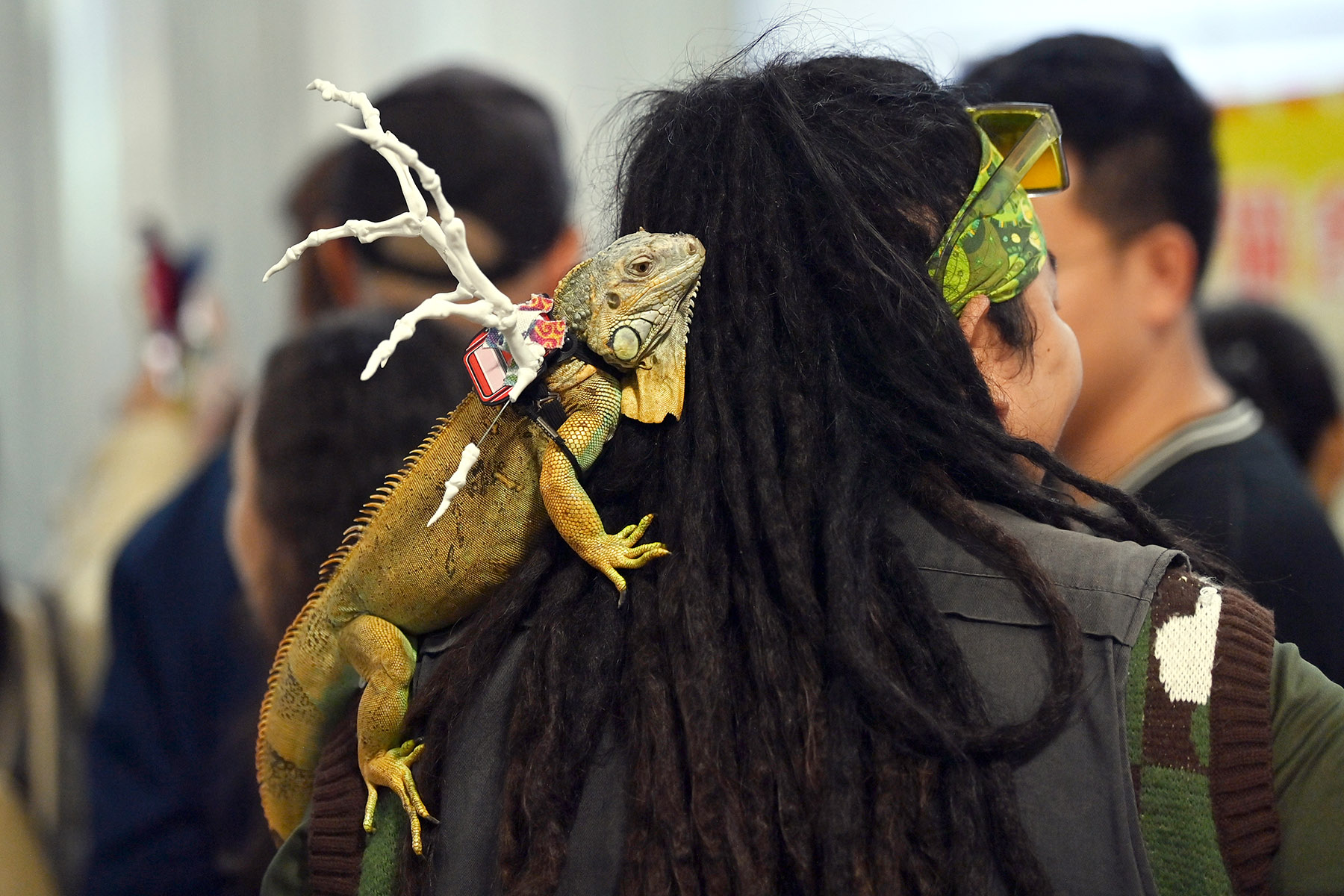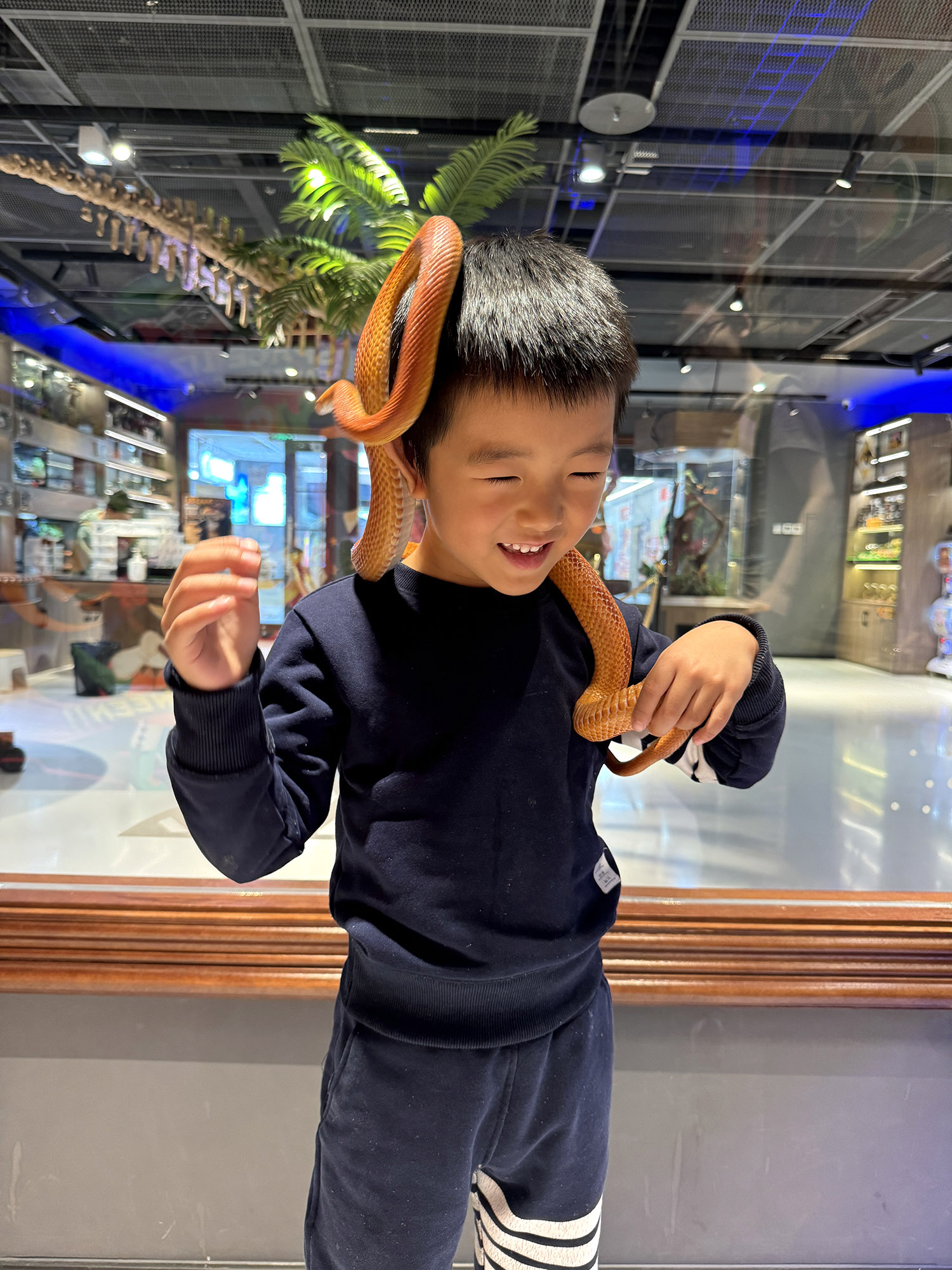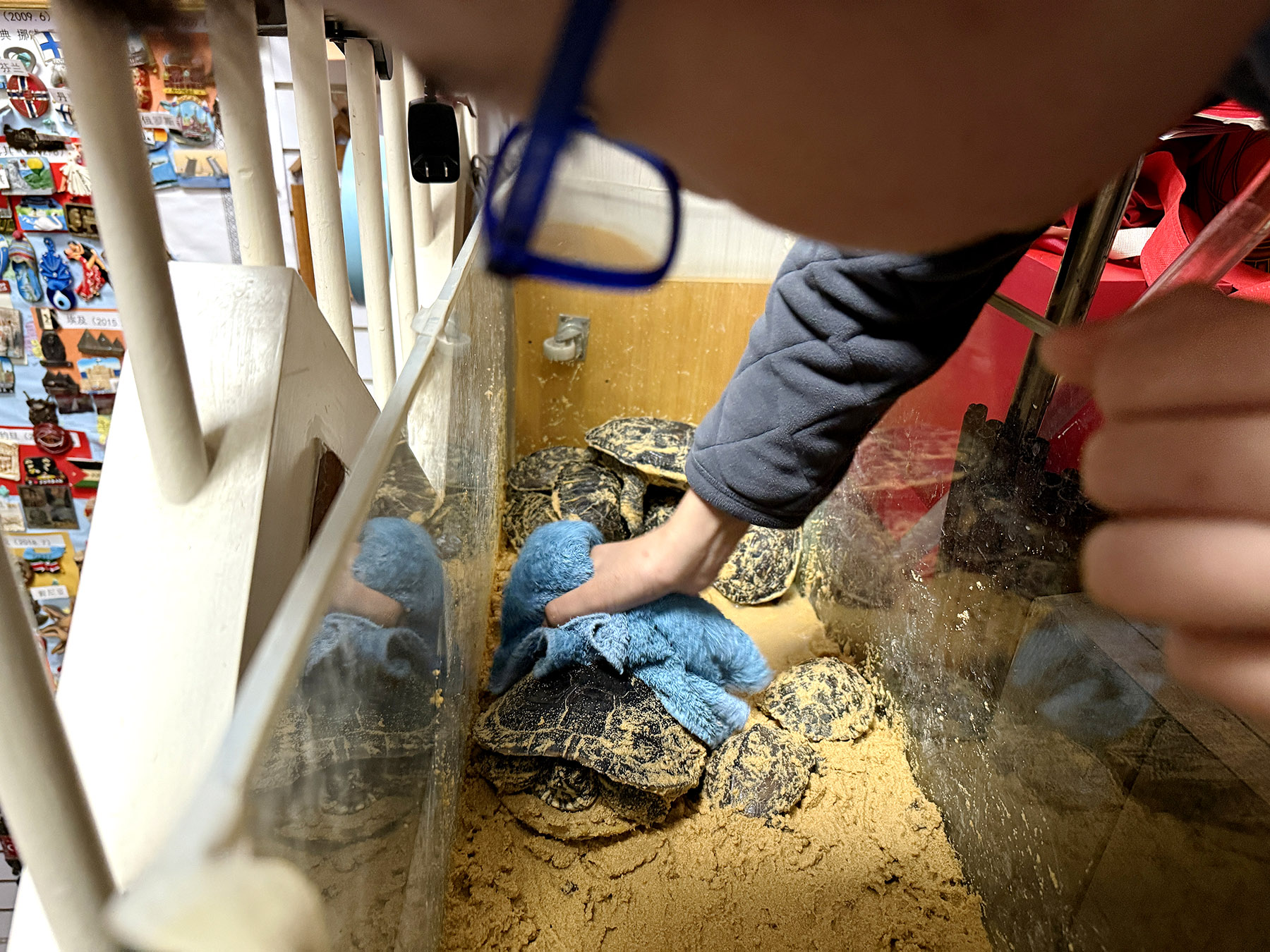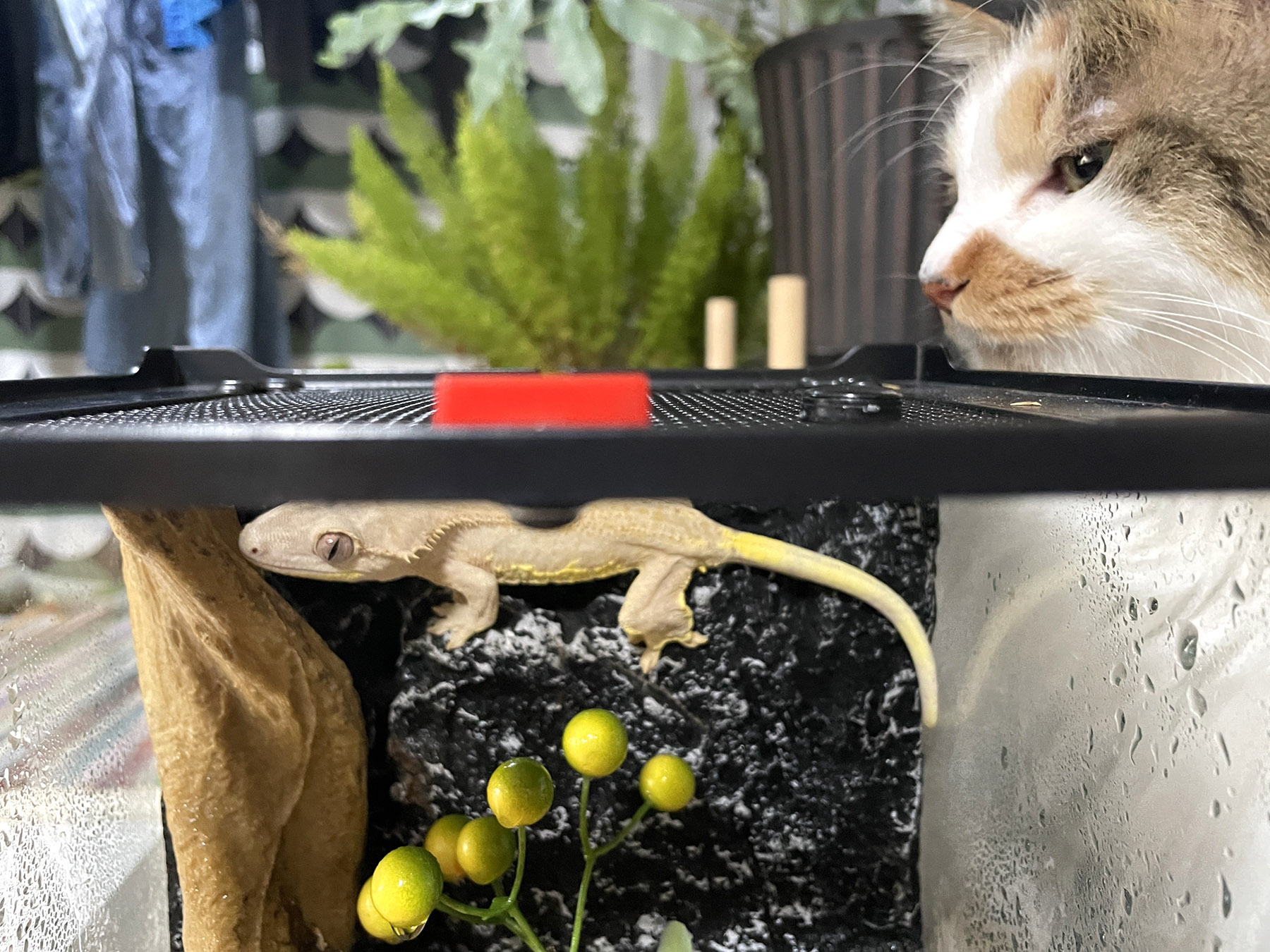Cold-blooded creatures grow in popularity as pets while understanding improves

Whenever Fu Jiajun returns home from college, the first place she rushes to is her balcony, where she's greeted by her growing family of reptile companions.
A large white lizard lies lazily in a white container, while nearby a digitally controlled cabinet houses a range of creatures. Snakes, lizards and turtles all coexist in a temperature-controlled environment.
"I just love to spend time observing them," said Fu, a college junior, who was born and raised in Shanghai.
Playing with her reptile friends was a daily routine during the recent Spring Festival holiday.
Fu's fascination with exotic pets began when she stumbled upon an ad for a leopard gecko in an online pet enthusiasts' group during her freshman year in 2022.
"It looked cute, and the price was right — just 200 yuan ($27.40). I couldn't resist, so I brought it to my apartment and then introduced it to our college's pet club," she recalled with a smile.
READ MORE: Exotic pets warm young hearts
Fu quickly realized how soothing it was to unwind by simply watching her new pet or holding it in her hands. "It's quiet and needs very little maintenance. All I have to do is make sure it has enough food and water, and the right temperature," she explained.
What started with one gecko soon grew into a menagerie of exotic creatures, thanks to pet shops, markets and online channels. "It's easy to get hooked," Fu said.
The biggest expenses are the enclosures and heating equipment, which cost around 700 yuan, she said. "The feed costs about 20 yuan a month," she said, adding that it's an affordable hobby.
Fu also has a cat and a dog, but she finds that the reptiles fulfill a different need.
"They're not noisy like traditional pets. I don't have to clean up after them every day. Unlike dogs or cats, these reptiles require very little space and are calm and easygoing, making them perfect companions for a busy lifestyle," she said.
She feels a deep sense of accomplishment watching her reptiles eat, shed their skin and grow under her care.

Breeds apart
Urbanization and small living spaces, along with the availability of exotic animals through imports and breeding, have sparked a growing interest in raising unique and rare animals in China, experts said.
The number of people keeping exotic pets continued to rise in 2024, according to a recent paper on the country's pet industry released by the pet industry data platform petdata.cn.
The report predicted that by 2026 the market for exotic pets in China will reach 7.68 billion yuan, with a compound annual growth rate of 19.8 percent for reptiles.
Turtles, snakes and geckos are the most commonly kept reptiles, with snakes accounting for 51.6 percent of the total. With the arrival of the Year of the Snake, many exotic pet owners have turned their attention to the reptiles, with choices ranging from elegant black kingsnakes to colorful and compact corn snakes.
At the Chaojiniaoju "Super Bird Bureau", a pet shop that sells and offers interactions with birds and reptiles in Shanghai, many parents brought their children to see the creatures at close quarters during the recent holiday.
The shop prepared about five snake species to display daily during the vacation period, and sold about 10 snakes every day, said Lu Jin, an employee.
Lu has noticed that parents are becoming more open-minded about their children keeping exotic pets. More children are also developing a keen interest in these animals and are braver than their parents when it comes to handling them, Lu added.
Zhao Hengjie, deputy secretary-general of the pet culture committee of the China Culture Administration Association, said strong demand for pet snakes is closely associated with the Year of the Snake, coupled with the ease and low cost of caring for them, which make them well-suited for a fast-paced city lifestyle.
Bi Yungang is an experienced snake seller in Guangzhou, Guangdong province. He said he sold more than 100 snakes in January. "Snake sales have been steadily growing, and the sales in 2024 were three times those of 2023," he said, adding that new reptiles for sale and price reductions on old ones had attracted previously hesitant buyers.
Bi, 28, said he has been fascinated by insects and reptiles since primary school, when one of his biggest passions was watching animal documentaries.
After settling in Guangzhou at the end of 2019, Bi came across a reptile pet store, which started his journey in keeping various reptiles.
What began with one or two reptiles soon grew to hundreds. Eventually, he started breeding them and entered the reptile pet sales business, and in 2023 he set up his own brand, JTG Reptile Little House.
After years of acquiring knowledge, and breeding and selling different reptiles, he ultimately decided to focus on pet snakes. "Just as many people fear snakes, many others are deeply fascinated by them. It is precisely because of the myths surrounding them and the innate fear humans have that once people truly understand their gentle and endearing nature, the stark contrast becomes irresistible," Bi said of their growing popularity.

Urban menagerie
Zhao Yanting, a Shanghai native in her 30s, opens her two-story apartment to students every week to share her passion for exotic pets.
She has over 50 lizards along with an extensive collection of more than 100 other species including bird-eating spiders, scorpions and centipedes.
To manage this growing menagerie, she has recruited young enthusiasts who regularly assist with feeding, breeding and packing the pets for shipment.
She fell into the world of exotic pets shortly after graduating in 2012, when a friend gifted her a bird-eating spider.
"I was never afraid of it. Instead, I found watching it go about its business — building its habitat, adapting to its environment — surprisingly fascinating. Creating the right conditions for it became a great source of distraction and fulfillment," she recalled.
As time passed, she realized that caring for the spider gave her a deeper connection with nature, inspiring her to expand her collection and increase her knowledge of reptile habits as well.
"Their care routine is relatively simple — feeding and maintenance are needed only once or twice a week. The biggest advantage of keeping exotic pets is their convenience and low upkeep costs," Zhao explained.
"As long as their environment is properly maintained, minimal intervention is needed."
In 2017, she married a man who specializes in breeding bird-eating spiders. Zhao then began breeding and selling pet reptiles through Taobao, a major online marketplace.
She believes that successfully breeding a reptile in captivity is the highest reward for a pet owner. "If it can reproduce in front of you, it means it has fully adapted to its environment — you've done everything right," she said.
Her online shop handles around 3,000 orders annually. "Most of my customers are students, and I can tell they truly love animals," she said, adding that she has witnessed a growing interest in exotic pets.
As pet ownership rises in China, Zhao believes more people will come to appreciate the unique charm of reptiles and arachnids. "Those who love cats and dogs are very likely to love exotic pet — once they get to know them better," she said.
Zhao has also created several documentaries about reptiles to challenge common misconceptions. Her efforts have earned her a strong following, with more than 100,000 subscribers across social media platforms like Bilibili and Xiaohongshu.
Bi has also witnessed firsthand the rapid growth of the reptile pet industry.
Over time, he has built a close-knit network with breeders, agents and sellers. Together, they actively promote one another's products and coordinate supply to meet market demand. "Overall, the reptile pet industry is experiencing strong, positive growth, with demand consistently outpacing supply," Bi said.
He added that while keeping reptiles was once considered an unconventional hobby, society's perceptions have shifted. More people now recognize the special charm and companionship that reptiles can offer.

Juvenile attractions
The consumer demographic is also evolving, with an increasing number of younger reptile pet owners. Students and college graduates are driving this trend, Bi said.
"Today's younger generation values personal experiences, and reptiles provide a fascinating connection to nature. They satisfy human curiosity for the wild while also offering emotional support," he said.
Bi has also noticed a growing number of investors turning their passion for reptiles into a side business.
He hopes for greater public understanding of his industry, believing that increased awareness can foster a deeper appreciation for both flora and fauna, ultimately contributing to wildlife conservation.
However, experts cautioned that consumers should find out whether the trade of a particular exotic pet is permitted, and avoid impulse purchases. This will help ensure that pets are not later abandoned.
Relevant authorities should strengthen management of where the animals are sourced, enhance quarantine supervision and law enforcement, and publicly disclose and regularly update the list of prohibited exotic pet species, they said.
In addition, an owner should be fully aware of the correct methods of caring for an exotic pet before taking it home.
Sun Quanhui, a senior scientific adviser with World Animal Protection, said once a decision is made to keep a pet, the owner must treat the animal well and respect its life. They should also be fully prepared to take on the responsibility of pet ownership, and never carelessly abandon a pet, as ecological problems might arise, such as species invasion.
ALSO READ: Exhibitors confident in HK’s burgeoning pet economy
Under Fu's influence, her parents — especially her mother, who once recoiled at the thought of reptiles — have gradually warmed to the cold-blooded creatures.
"Now, she's even started keeping her own pet geckos!" Fu said with a laugh.
"It's all about changing misconceptions. Many people fear exotic animals simply because they've never had the chance to interact with them," she said.
Fu has noticed a growing community of young people who are as fascinated as she is by these creatures. "I've made friends I can share knowledge and exchange tips with, and even visit pet markets with to discover new species," she added.
Fu plans to expand her "reptile circle" once she's financially independent.
"I've already got my eye on a blue-tongue skink. They cost around 3,000 to 4,000 yuan, are bigger, and have a more stable temperament. I imagine they'd be a fantastic addition to my collection," she said.


